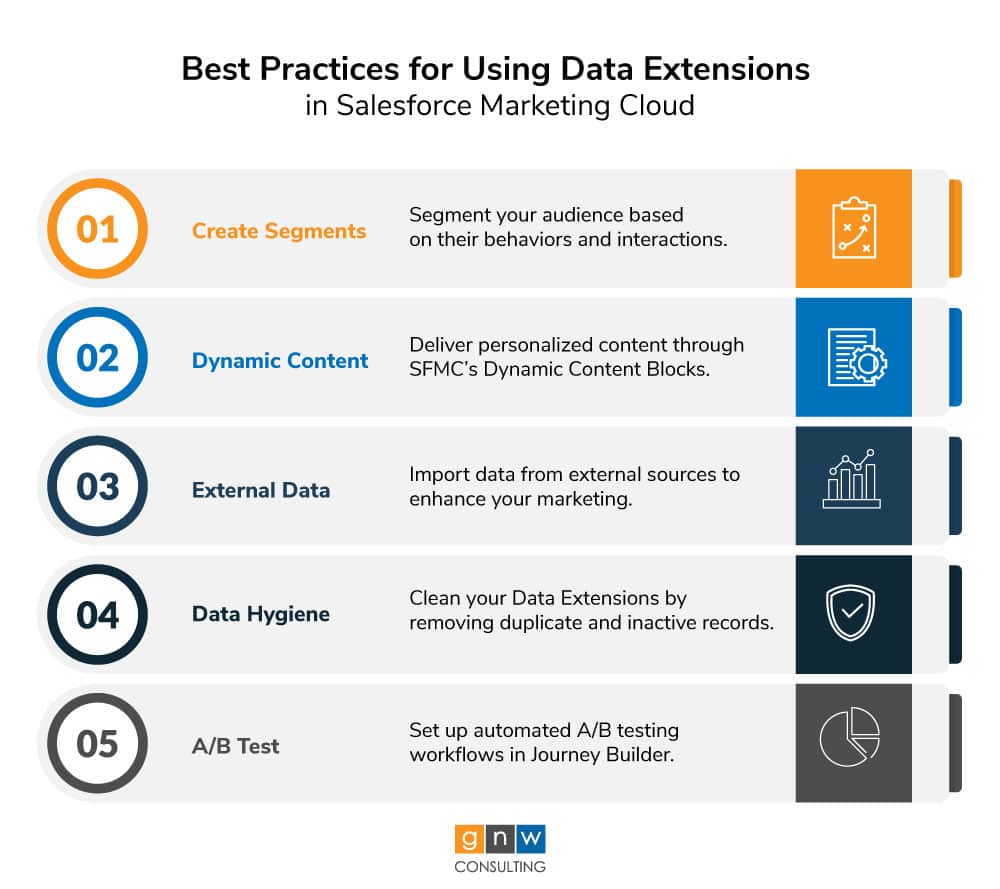
In today’s competitive marketing landscape, data-driven campaigns are essential for delivering personalized and effective customer experiences. Salesforce Marketing Cloud (SFMC) offers robust tools to help marketers leverage customer data to create highly targeted marketing campaigns. One of the most powerful features of SFMC is Data Extensions, which allow you to store and manage customer data for advanced segmentation and personalization.
In this article, we’ll explore how to use Salesforce Marketing Cloud Data Extensions to enhance your targeted marketing efforts, and provide best practices for maximizing the value of your data.
What Are Data Extensions in Salesforce Marketing Cloud?
Data Extensions in Salesforce Marketing Cloud are customizable tables that allow you to store various types of customer data beyond the standard fields found in SFMC’s Subscriber Lists. They enable you to import, manage, and organize large volumes of data from different sources, such as CRM systems, websites, and other marketing platforms.
Data Extensions give you more flexibility and control over how you structure and segment your data, making them ideal for creating complex, data-driven campaigns that require advanced targeting.
Benefits of Using Data Extensions in Salesforce Marketing Cloud
Data Extensions provide several key benefits for marketers looking to create highly targeted and personalized campaigns:
- Flexible Data Storage: Data Extensions allow you to store custom data fields that aren’t available in the standard subscriber lists, providing more flexibility in how you manage customer information.
- Advanced Segmentation: With Data Extensions, you can create highly targeted segments based on any combination of customer attributes, behaviors, or interactions. This leads to more relevant and personalized marketing messages.
- Data Integration: You can easily integrate data from various sources, such as Salesforce CRM or third-party platforms, to create a unified view of each customer and enhance your segmentation efforts.
Personalized Campaigns at Scale: By leveraging customer data stored in Data Extensions, you can deliver personalized campaigns at scale, improving engagement and conversions.
Best Practices for Using Data Extensions in SFMC
To maximize the value of your Data Extensions in Salesforce Marketing Cloud, follow these best practices for segmentation, personalization, and data management:
1. Create Segments Based on Customer Behavior
One of the most powerful uses of Data Extensions is the ability to segment your audience based on their behaviors and interactions. For example, you can create segments based on purchase history, website activity, or email engagement.
Tip: Use Automation Studio to update your Data Extensions automatically based on real-time customer behavior. This allows you to send timely and relevant marketing messages without manual intervention.
2. Leverage Dynamic Content for Personalization
Once you’ve segmented your audience, you can use the data stored in Data Extensions to deliver personalized content through SFMC’s Dynamic Content Blocks. Dynamic content allows you to customize parts of an email based on individual customer attributes, such as their location, product preferences, or loyalty status.
Tip: Personalize product recommendations or special offers by using Data Extensions to store purchase history and product preferences. You can then display relevant offers in your emails based on this data.
3. Integrate External Data Sources
Data Extensions enable you to import data from external sources, such as Salesforce CRM, websites, or e-commerce platforms, and use it to enhance your marketing efforts. By integrating data from multiple platforms, you can create more comprehensive customer profiles and improve your targeting strategies.
Tip: Use Data Import Activities in Automation Studio to regularly import customer data from external systems and update your Data Extensions automatically. This ensures your segments are always up to date.
4. Maintain Data Hygiene
Keeping your Data Extensions clean and well-organized is essential for successful targeted marketing. Poor data hygiene can lead to inaccurate segments, duplicate entries, or compliance issues.
Tip: Regularly clean your Data Extensions by removing duplicate or inactive records, and use data validation techniques to ensure that the information stored in your Data Extensions is accurate.
5. A/B Test Targeted Campaigns
Data Extensions allow you to test different versions of your campaigns by segmenting your audience based on various attributes. By conducting A/B tests on different segments, you can determine which messaging, offers, or content resonate best with each group.
Tip: Set up automated A/B testing workflows in Journey Builder to test different content variations for specific segments stored in your Data Extensions. This will help you optimize your messaging for maximum engagement.

Use Case: Targeted Email Campaign with Data Extensions
Let’s say you’re running an e-commerce business and want to target customers who haven’t made a purchase in the last six months. You can create a Data Extension to store customer purchase history and use that data to segment your audience into “active customers” and “lapsed customers.”
With this segmentation, you can then create a re-engagement campaign for the lapsed customers, offering them a personalized discount or incentive to return to your store. By using the data stored in the Data Extension, you can ensure that your message is relevant and timely, increasing the chances of conversion.
Conclusion
Salesforce Marketing Cloud Data Extensions provide marketers with the flexibility and power needed to create highly targeted and personalized marketing campaigns. By leveraging data extensions, you can segment your audience more effectively, personalize your content, and ultimately drive better results from your marketing efforts.
For more insights on data-driven marketing, be sure to read our in-depth Salesforce Marketing Cloud Optimization article, where we cover advanced strategies to help you maximize your marketing potential.
By following best practices for data segmentation, personalization, and data management, you can unlock the full potential of Salesforce Marketing Cloud and create more meaningful, data-driven marketing experiences for your audience.
Discover how GNW can optimize your marketing operations contact us at [email protected].
Request A Marketing Cloud Review:
A Marketing Cloud review from GNW Consulting will highlight any areas within the system that need to be fixed or optimized so you can really optimize the platform.
Following the review, we can talk about how we address the recommendations.
Discover how GNW can optimize your marketing operations contact us at [email protected].